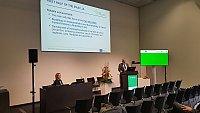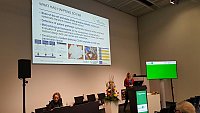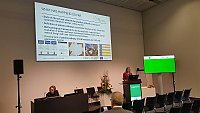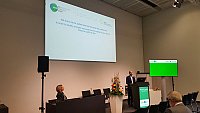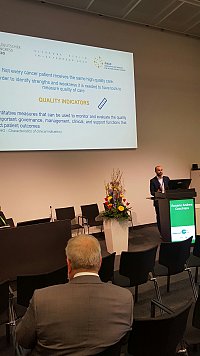20. 02. 2020 – 20. 02. 2020 | Berlin
The second German Local Stakeholder Forum (LSF) of the Joint Action “Innovative Partnership for Action Against Cancer” (iPAAC) was held in Berlin on 20 February 2019, within the framework of the 34th German Cancer Congress.
The Deutscher Krebskongress (German Cancer Congress) is the largest and oldest congress covering cancer diagnostics and therapy in German-speaking countries. The 34th German Cancer Congress took place from 19 to 22 February 2020 in Berlin and was hosted by the German Cancer Society. Attendees were healthcare providers in the field of oncology, patients, representatives from German stakeholders in health policy, such as federal ministries, social health insurances, scientific societies and representatives from the health industry.
Speakers of the second German Local Stakeholder Forum were:
- Tit Albreht, National Institute of Public Health, Ljubljana, Scientific Coordinator iPAAC JA
- Ellen Griesshammer, German Cancer Society, Berlin and deputy-leader of WP 10
- Peggy Richter, Research Associate at Technical University of Dresden and responsible for Task 2 Patient Pathways of WP 10
- Rosario Cocchiara, La Sapienza University, Rome, responsible for Task 3 Quality Indicators of WP 10
To start with, Tit Albreht gave an overview of the whole JA iPAAC. He described the goals of each work package focussing on the deliverables and overall objectives including the conceptual framework of the Roadmap on Implementation and Sustainability of Cancer Control Actions. He also presented an update of the current discussions happening at the EU level in regard to the kick-off event to the Europe Beating Cancer Plan.
Ellen Griesshammer followed this presentation with an overview of the state of play of WP 10 “Governance of Comprehensive and Integrated Cancer Care”. She outlined the structure of the overall work package and updated the participants on the status of the tasks. Within WP 10, different instruments with importance for providing and ensuring high quality oncological care (e.g. Patient Pathways, Quality Indicators, Patient Reported Outcome Measurements) are being developed. Additionally, a set of generic and tumour-specific requirements for the setup of Comprehensive Cancer Care Networks (CCCN) is defined. Finally, CCCNs including the developed instruments will be implemented at two pilot sites (Berlin and Wroclaw). Mrs. Griesshammer explained, how the work on WP 10 proceeds and outlined the collaboration with other WPs (such as WP 8 or 7).
Afterwards Peggy Richter gave an insight into the work of task 2 Patient Pathways of WP 10 of iPAAC. The different sub-tasks were presented. The definition of patient pathways and analysis of existing oncological patient pathways were described as well as the defined methodological standards for the patient pathway. The current status of the model for the colorectal cancer patient pathways was shown and the next planned steps highlighted.
To sum up, Rosario Concchiara then presented the work which was done under task 3. Here the objective was to conduct a literature review of already implemented quality indicators and their respective methodologies. On the basis of the results of the literature review, development (through a consensus process within the working group) of a standardised methodology to derive specific, measurable, achievable and timebound QIs for the use in CCCNs. The agreed upon methodology was used to derive a set of general and tumour specific QIs which will now be piloted within the two CCCNs.
Documents
- Agenda (PDF file, 110 kB)
